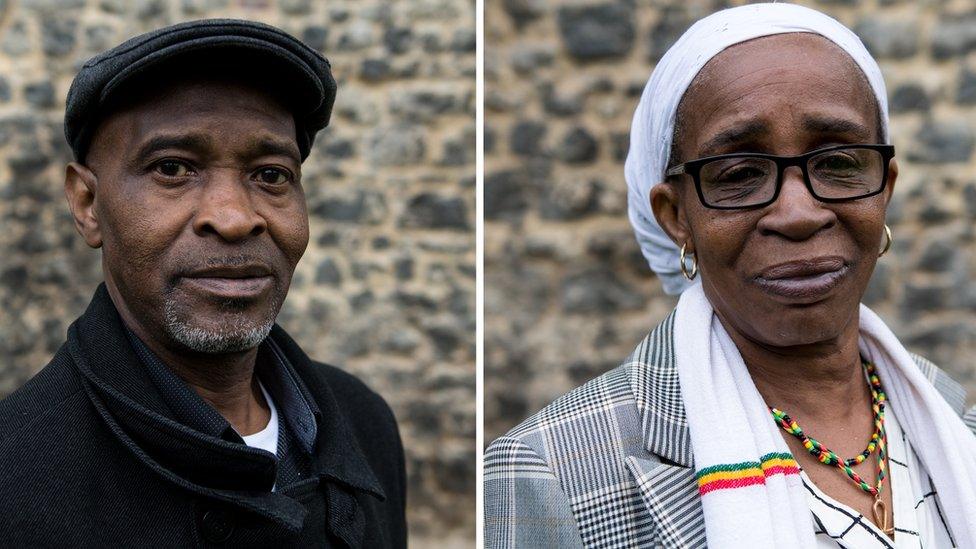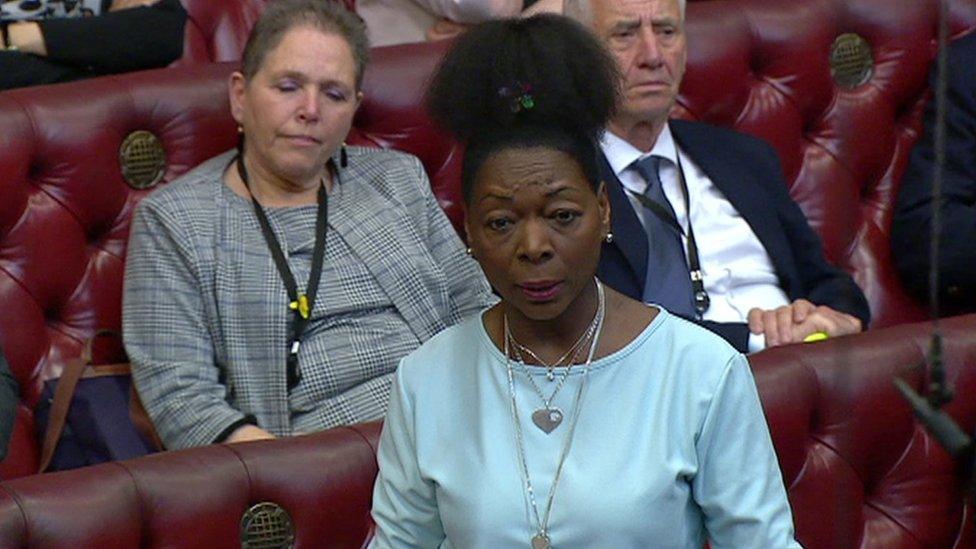Windrush scandal: Home Office immigration approach 'needs reform'
- Published

"Root and branch reform" of the Home Office's approach to immigration is needed following the Windrush scandal, according to a committee of MPs.
The Windrush generation were "badly let down" and had to follow processes apparently designed to "set them up to fail", said the Home Affairs Committee.
They called for urgent action to make sure the scandal is not repeated.
Home Secretary Savid Javid's top priority is to "right the wrongs that have occurred", the Home Office said.
The Windrush scandal began to be uncovered earlier this year when it emerged that some migrants from Commonwealth countries, who were encouraged to settle in the UK from the late 1940s to 1973, were being wrongly categorised as illegal immigrants.
Some who had lived and worked in the UK for years were threatened with deportation or refused jobs and healthcare.
'Scepticism and suspicion'
Committee chairwoman Yvette Cooper said people had been "denied their rights and treated appallingly by the Home Office" and that there was "still a very long way to go to put this right or to ensure it won't happen again".
She told BBC Radio 4's Today programme: "We found when looking at what's happened to the Windrush generation that thousands of people have been denied their rights and have been badly let down by the Home Office.
"It's truly appalling what's happened to people who have been here lawfully, many of them British citizens.
"That's why we looked at areas around the culture that had developed - the lack of discretion, the treating people with scepticism and suspicion - we've looked at some of the policies that affected people, and also the lack of oversight in the system, the lack of any checks and balances to prevent it happening.
"In each of those areas, change is needed to make sure this kind of thing can't happen again."

Yvette Cooper said the Windrush generation had been let down
The "hostile environment" approach to immigration used by the Home Office was criticised in the report, external, with the MPs questioning if it should be allowed to continue in its current form.
Home Secretary Sajid Javid has already said he rejects the term, preferring the phrase "compliant environment" - but the committee described the renaming as "meaningless" rebranding.
They committee said: "It is irresponsible of government to rely on a policy when it lacks information on whether it is leading to injustice or abuse or achieving aims."
The MPs also said they were concerned that enforcement targets may have led to a "focus on people like the Windrush generation who may have been easier to detain and remove".

Analysis
By Danny Shaw, BBC home affairs correspondent
This detailed report, compiled in less than six weeks, is the most comprehensive attempt so far to explain why the Windrush scandal came about and scrutinise the government's response.
But tellingly, it suggests there's still a lot of crucial information we don't know: the links between removal targets and bonuses; the advice civil servants gave to ministers on the issue; and how many Windrush migrants have been wrongfully detained, deported and deprived of the rights they should have had.
There's also concern that the policies and mistakes will be repeated with other potentially vulnerable groups - undocumented children, people from the Chagos Islands and EU citizens seeking to settle in the UK indefinitely.
It's a reminder for Sajid Javid to keep his eye firmly on the ball as the media attention over Windrush inevitably subsides.

Some 8,000 people have now contacted the Windrush task force set up by the government, with more than 2,000 receiving documents confirming their right to stay in Britain.
But there are "too many unanswered questions" and the Home Office should now reveal how many people have been unlawfully subject to deportation, detention and reporting requirements, the report said.
Unless lessons are learned from the Windrush scandal, the same mistakes could happen with the three million EU nationals living in the UK who have to take on a new migrant status after Brexit, the MPs warned.
They said there are 144,000 children currently in Britain who could be in a similar situation to the Windrush migrants because they do not have the documents proving their right to be here.
Failing to solve the problem of those undocumented children "will leave many in a precarious position, unable to study, work or seek the support of social security as they transition into adulthood", they warned.
A look back at life when the Windrush generation arrived in the UK
Responding to the report, the Home Office spokesman said: "A lessons learned review, which will have independent oversight, will help ensure that we have a clear picture of what went wrong and how we should take this forward.
"But in the meantime we are already reviewing existing safeguards to ensure that those who are here lawfully are not inadvertently disadvantaged by measures put in place to tackle illegal migration."
- Published30 June 2018

- Published29 June 2018

- Published22 June 2018

- Published16 April 2018

- Published21 June 2018

- Published24 May 2018

